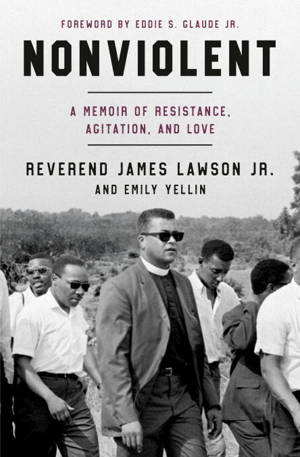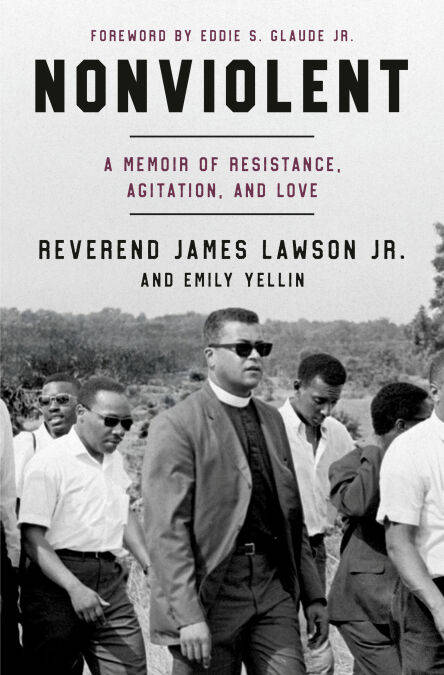
- Afhalen na 1 uur in een winkel met voorraad
- Gratis thuislevering in België vanaf € 30
- Ruim aanbod met 7 miljoen producten
- Afhalen na 1 uur in een winkel met voorraad
- Gratis thuislevering in België vanaf € 30
- Ruim aanbod met 7 miljoen producten
Zoeken
Nonviolent E-BOOK
A Memoir of Resistance, Agitation, and Love
Reverend James Lawson Jr., Emily Yellin
E-book | Engels
€ 17,34
+ 17 punten
Uitvoering
Omschrijving
The posthumous memoir of Rev. James Lawson Jr., peer of Dr. Martin Luther King Jr., mentor to Congressman John Lewis and the Freedom Riders, and a principal architect of a nonviolent resistance movement that changed the world.
“This book is a gift to be treasured, from a man who has already given so much.”—Jonathan Eig, Pulitzer Prize–winning author of King: A Life
Rev. Lawson was one of the most influential yet unheralded heroes of the civil rights era. He rose as a strategist, teacher, and organizer in pivotal campaigns on the national stage against racial and economic injustice.
Lawson’s memoir spans 95 years, but it begins far from the spotlight in a large, working-class Ohio family. The son and grandson of Methodist ministers, he receives his license to preach before graduating from high school.
Lawson goes on to serve time in prison for refusing the Korean War draft, and learns from independence movements during three years in India and Africa. He then fortifies the principles of a new American Revolution when he teaches nonviolent direct action centered in love and moral clarity to the Little Rock Nine, the Mississippi Freedom Summer volunteers, and countless others. He also becomes a leader in the 1960 Nashville sit-ins, the 1963 Birmingham campaign, the 1966 Meredith March Against Fear, and the 1968 Memphis sanitation workers' strike.
Nonviolent delivers an intimate self-portrait of Lawson as a man who recognized the inherent dignity of everyone, and challenged all forms of violence, including police brutality, enforced poverty, and what he called plantation capitalism. It shows his quest for justice continuing in Los Angeles well into the 21st century, as he helped foster a more inclusive labor movement and an enduring immigrant rights movement.
Nonviolent is a riveting historical narrative from a central figure in global liberation and a testament to compelling a nation to live up to its founding ideals of liberty and justice for all.
“This book is a gift to be treasured, from a man who has already given so much.”—Jonathan Eig, Pulitzer Prize–winning author of King: A Life
Rev. Lawson was one of the most influential yet unheralded heroes of the civil rights era. He rose as a strategist, teacher, and organizer in pivotal campaigns on the national stage against racial and economic injustice.
Lawson’s memoir spans 95 years, but it begins far from the spotlight in a large, working-class Ohio family. The son and grandson of Methodist ministers, he receives his license to preach before graduating from high school.
Lawson goes on to serve time in prison for refusing the Korean War draft, and learns from independence movements during three years in India and Africa. He then fortifies the principles of a new American Revolution when he teaches nonviolent direct action centered in love and moral clarity to the Little Rock Nine, the Mississippi Freedom Summer volunteers, and countless others. He also becomes a leader in the 1960 Nashville sit-ins, the 1963 Birmingham campaign, the 1966 Meredith March Against Fear, and the 1968 Memphis sanitation workers' strike.
Nonviolent delivers an intimate self-portrait of Lawson as a man who recognized the inherent dignity of everyone, and challenged all forms of violence, including police brutality, enforced poverty, and what he called plantation capitalism. It shows his quest for justice continuing in Los Angeles well into the 21st century, as he helped foster a more inclusive labor movement and an enduring immigrant rights movement.
Nonviolent is a riveting historical narrative from a central figure in global liberation and a testament to compelling a nation to live up to its founding ideals of liberty and justice for all.
Specificaties
Betrokkenen
- Auteur(s):
- Uitgeverij:
Inhoud
- Aantal bladzijden:
- 688
- Taal:
- Engels
Eigenschappen
- Productcode (EAN):
- 9780593596258
- Verschijningsdatum:
- 16/02/2026
- Uitvoering:
- E-book
- Beveiligd met:
- Adobe DRM
- Formaat:
- ePub

Alleen bij Standaard Boekhandel
+ 17 punten op je klantenkaart van Standaard Boekhandel
Beoordelingen
We publiceren alleen reviews die voldoen aan de voorwaarden voor reviews. Bekijk onze voorwaarden voor reviews.








